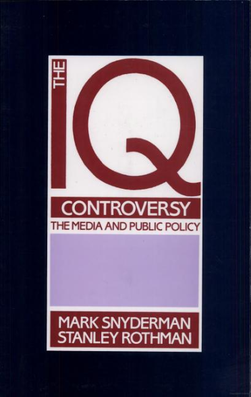Genius is a characteristic of original and exceptional insight in the performance of some art or endeavor that surpasses expectations, sets new standards for the future, establishes better methods of operation, or remains outside the capabilities of competitors. Genius is associated with intellectual ability and creative productivity, and may refer to a polymath who excels across many subjects.
Emotional intelligence (EI) is most often defined as the ability to perceive, use, understand, manage, and handle emotions. People with high emotional intelligence can recognize their own emotions and those of others, use emotional information to guide thinking and behavior, discern between different feelings and label them appropriately, and adjust emotions to adapt to environments. Although the term first appeared in 1964, it gained popularity in the 1995 best-selling book Emotional Intelligence, written by science journalist Daniel Goleman. Goleman defined EI as the array of skills and characteristics that drive leadership performance.
Intellectual giftedness is an intellectual ability significantly higher than average. It is a characteristic of children, variously defined, that motivates differences in school programming. It is thought to persist as a trait into adult life, with various consequences studied in longitudinal studies of giftedness over the last century. There is no generally agreed definition of giftedness for either children or adults, but most school placement decisions and most longitudinal studies over the course of individual lives have followed people with IQs in the top 2.5 percent of the population—that is, IQs above 130. Definitions of giftedness also vary across cultures.
Gifted education is a broad group of special practices, procedures, and theories used in the education of children who have been identified as gifted or talented.

Lewis Madison Terman was an American psychologist and author. He was noted as a pioneer in educational psychology in the early 20th century at the Stanford Graduate School of Education. He is best known for his revision of the Stanford–Binet Intelligence Scales and for initiating the longitudinal study of children with high IQs called the Genetic Studies of Genius. He was a prominent eugenicist and was a member of the Human Betterment Foundation. He also served as president of the American Psychological Association. A Review of General Psychology survey, published in 2002, ranked Terman as the 72nd most cited psychologist of the 20th century, in a tie with G. Stanley Hall.

The Nueva School is a private school, with two campuses—the lower and middle school in Hillsborough, and the high school in San Mateo, California—serving gifted students in pre-kindergarten through twelfth grade. Nueva was founded in 1967 by Karen Stone McCown. Originally, the Nueva School only served younger students, but in 2013 it expanded to include a high school, and a new campus for it was built as part of the Bay Meadows development in San Mateo, opening in August 2014.
The Highly Gifted Magnet (HGM) is part of the Los Angeles Unified School District's Gifted and Talented program, designed for students of extraordinary intelligence who have unique intellectual, social and emotional abilities not nurtured by normal Gifted programs. The purpose is to cluster students of similar capabilities and needs with teachers who can challenge them with greater academic and intellectual rigor while meeting their social and emotional needs. These relatively small programs are housed on larger campuses. In a Los Angeles Times review that separated Magnet test scores from their host schools, HGMs consistently had the highest standardized test scores of all LAUSD schools.
Emotional competence and Emotional capital refer to the essential set of personal and social skills to recognize, interpret, and respond constructively to emotions in oneself and others. The term implies an ease around others and determines one's ability to effectively and successfully lead and express.

The IQ Controversy, the Media and Public Policy is a book published by Smith College professor emeritus Stanley Rothman and Harvard researcher Mark Snyderman in 1988. Claiming to document liberal bias in media coverage of scientific findings regarding intelligence quotient (IQ), the book builds on a survey of the opinions of hundreds of North American psychologists, sociologists and educationalists conducted by the authors in 1984. The book also includes an analysis of the reporting on intelligence testing by the press and television in the US for the period 1969–1983, as well as an opinion poll of 207 journalists and 86 science editors about IQ testing.

Academic acceleration is moving students through an educational program at a rate faster or at an age younger than is typical. Students who would benefit from acceleration do not necessarily need to be identified as gifted in a particular subject. Acceleration places them ahead of where they would be in the regular school curriculum. It has been described as a "fundamental need" for gifted students as it provides students with level-appropriate material. The practice occurs worldwide. The bulk of educational research on academic acceleration has been within the United States.

IQ classification is the practice by Intelligence quotient (IQ) test publishers of labeling IQ score ranges with category names such as "superior" or "average".

Leta Stetter Hollingworth was an American psychologist, educator, and feminist. Hollingworth also made contributions in psychology of women; clinical psychology; and educational psychology. She is best known for her work with gifted children.
Annemarie Roeper was a pioneer in gifted education who founded the Roeper School (Michigan) with her husband George in 1941. The school continues on two campuses: lower elementary grades in Bloomfield Hills and Middle-Upper Elementary in Birmingham, in Michigan.
The Genetic Studies of Genius, later known as the Terman Study of the Gifted, is currently the oldest and longest-running longitudinal study in the field of psychology. It was begun by Lewis Terman at Stanford University in 1921 to examine the development and characteristics of gifted children into adulthood.
The term emotional literacy has often been used in parallel to, and sometimes interchangeably with, the term emotional intelligence. However, there are important differences between the two. Emotional literacy was noted as part of a project advocating humanistic education in the early 1970s.
Six Seconds is a California-based international 501(c)3 non-profit organization that researches and teaches emotional intelligence. Founded in 1997, Six Seconds is the first and largest organization dedicated to the development of emotional intelligence, with offices in 10 countries and agents in about 50. The stated mission is to increase the world’s emotional intelligence, by working in business, education and other areas.

Joshua Freedman is a specialist on emotional intelligence, an author, and the Chief Executive Officer of Six Seconds, a non-profit dedicated to emotional intelligence (EQ). He has helped co-develop EQ assessments and published a number of books and articles on the topic, creating an international network of consultants and coaches.

Intertel is a high-IQ society founded in 1966, that is open to those who have scored at or above the 99th percentile on one of various standardized tests of intelligence. It has been identified as one of the notable high-IQ societies established since the late 1960s with admissions requirements that are stricter and more exclusive than Mensa.

Reuven Bar-On is an Israeli psychologist and one of the leading pioneers, theorists and researchers in emotional intelligence. Bar-On is thought to be the first to introduce the concept of an “EQ” to measure “emotional and social competence”, although the acronym was used earlier to describe ideas that were not associated with emotional intelligence per se. In the first copy of his doctoral dissertation, which was submitted in 1985, Bar-On proposed a quantitative approach to creating “an EQ analogous to an IQ score”.
Note: this article is about two distinct but related schools for gifted education in New York City, USA: the Speyer Legacy School, and the Speyer School (1935-1941). The present-day school is named after the earlier one, and takes its inspiration from the approach to gifted education that was developed there.









